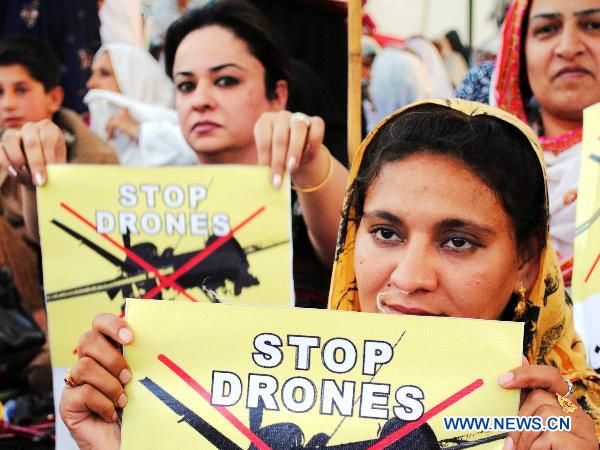Protest against U.S. drone strikes continues in Pakistan
|
|
|
Women of civil society hold placards against U.S. drone attacks during a protest rally in northwest Pakistan's Peshawar on April 23, 2011. [Xinhua Photo/Saeed Ahmad] |
Hundreds of people calling for halt to U.S. drone strikes in Pakistan's tribal regions have spent the Saturday night on the main NATO supply route in the country's northwest and the two-day sit-in would continue the whole day on Sunday, said organizers.
Cricketer-turned politician, Imran Khan, head of Tehrik-e-Insaf (Justice Movement), who had called for the two-day protest, also spent the night with hundreds of protesters along the main highway connecting Pakistan with Afghanistan, said the organizers.
Senior leader of Tehrik-e-Insaf party Asad Qaisar said the protesters will also spend the day on Sunday and Imran Khan will announce future plan at the conclusion of the sit-in.
According to Qaisar, people from other areas started coming to join the protest Sunday morning and political leaders of other parties will also join the protest to show unity.
Imran Khan told thousands of people on the first day of protest in Peshawar, capital of Khyber Pakhtunkhwa, that more protest rallies would be planned in the coming days unless the CIA stops drone strikes.
"The government has failed to stop the U.S. strikes which kill innocent people including women and children," said Imran Khan at the gathering.
Anger runs high in Pakistan against the U.S. drone strikes in the Waziristan tribal areas which CIA considers as the base for al- Qaeda and Afghan Taliban militants for planning attacks across the border into Afghanistan.
Despite the public resentment and Pakistan's protest, the U.S. administration has rejected any possibility to halt the strikes.
The protest came just a day after two U.S. drone aircraft fired missiles into North Waziristan tribal region, which reportedly killed 25 people including women and children.
Several opposition Islamic, political groups and tribal elders have also taken part in the on-going protest. Some family members of U.S. drone strike victims also attended the protest.
Currently nearly 70 percent of the NATO supplies in Afghanistan are transported through Pakistan, the most risky but shorter supply route. Suspected militants regularly attack NATO trucks in Pakistan, which has forced the U.S. to sign agreements with Russia for an alternate supply route.
According to the reports, the supply trucks and oil tankers for the estimated 150,000 NATO troops were stopped in eastern Punjab province from heading to the border region due to the protest.
It is reported that some 300 trucks and oil tankers are daily passing through Pakistan's Khyber Pass. A similar number also enter Afghanistan through Chaman border in the country's southwestern province of Balochistan province.
 0
0 







